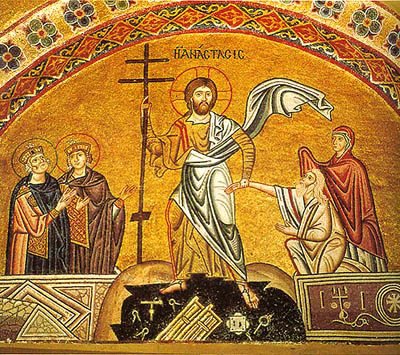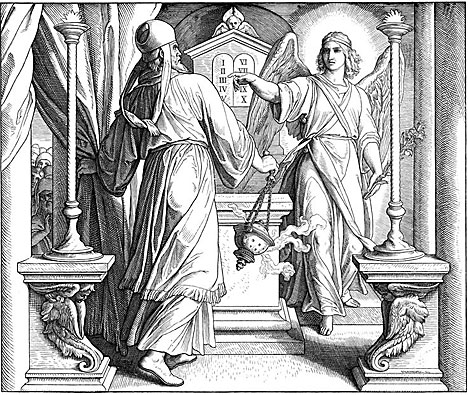Mar
3
2013

Is dispensationalism a theological framework or a hermeneutical approach?
Dispensationalism pretends to be a “literalistic” hermeneutical approach, but it is in fact a contrived framework which results from a single, fundamental error. The fact that this error is so foundational is the reason why its “prophetic plan” is so complicated.
Continue reading
3 comments | tags: AD70, Dispensationalism, Ezekiel | posted in Biblical Theology, Q&A, The Last Days, The Restoration Era
Feb
18
2013
 or What Was A Nazirite?
or What Was A Nazirite?
“A defiled Nazirite is an Adam or an Eve who has failed at holy war and thus cannot enter into God’s rest.”
Since I rave on about structure so much (and how wrong it is that we moderns regard it as merely an ornamental option rather than as the label on the tin) the fractalicious* Covenant structure of Numbers 6 should give us some clues as to what the Nazirite vow actually was in the big picture.
Continue reading
2 comments | tags: Baptism, Literary Structure, Nazirite, Numbers, Numbers 6 | posted in Bible Matrix, Biblical Theology, The Last Days
Feb
13
2013

“Picasso did not paint for the eyes but for the gut. He painted for the gut that the eyes might be opened.”
One only has to compare a portrait of Picasso’s wife to that of one his lovers to prove that his strange perspective on reality worked from the inside out. What we feel as we observe his works is what he feels about his subjects as he paints them. The spirit and desire which animate man and beast not only move flesh but, in Picasso’s world, distort reality. Time and history without fail reveal the true character of objects, people and ideologies. A Picasso is often the exterior of a person or event shaped or distorted by the spirit and emotion within. It is a history in a single frame, an X ray that discovers not the bones but the heart. Emotional reality is revealed in shape and color. In these cases, his subjects are possibly “ethical nudes.”
This post has been slain and resurrected for inclusion in my 2015 book of essays, Inquietude.
Continue reading
Comments Off | tags: Culture, Numbers 5, Revelation, Temple | posted in Biblical Theology, The Last Days
Jan
24
2013
Final excerpt from the early pages of A. T. Ross’ Hebrews commentary. Part 1 here.
Temple and Typology
The evidence that Hebrews was written before the fall of Jerusalem in A. D. 70 is strengthened by a few other observations. Timothy is said to be alive (13:23), and while it cannot be certainly determined that this is the same Timothy that traveled with Paul, there exists no good reason not to think it is the same Timothy to whom Paul wrote two epistles.
Continue reading
2 comments | tags: AD70, Adam Ross, Hebrews | posted in Biblical Theology, Quotes, The Last Days
Jan
23
2013
 [Today and tomorrow I’m posting a couple of excerpts from the draft of a forthcoming book-length commentary by A. T. Ross, The Messianic Priest-King: An Exposition of the Book of Hebrews. His goal has been to take an approach to Hebrews similar to David Chilton’s concerning the book of Revelation, “paying close attention to the symbolic dimension and how the intertextual uses of the Old Testament impacted the argument.” Dealing with the chiastic structures and typology, and quoting all the best guys, Adam has really done his homework. I’ll keep you posted on publication.]
[Today and tomorrow I’m posting a couple of excerpts from the draft of a forthcoming book-length commentary by A. T. Ross, The Messianic Priest-King: An Exposition of the Book of Hebrews. His goal has been to take an approach to Hebrews similar to David Chilton’s concerning the book of Revelation, “paying close attention to the symbolic dimension and how the intertextual uses of the Old Testament impacted the argument.” Dealing with the chiastic structures and typology, and quoting all the best guys, Adam has really done his homework. I’ll keep you posted on publication.]
Continue reading
Comments Off | tags: Adam Ross, Hebrews | posted in Biblical Theology, Quotes, The Last Days
Dec
26
2012

Here’s some interesting calculations concerning the day of Jesus’ birth in relation to Israel’s festal calendar. It was written by Michael Scheifler (a Seventh-day Adventist), and is reproduced here with his permission.
While much of the world celebrates the birth of Jesus Christ on the 25th of December, can the actual day of Jesus’ birth be determined from scripture? This question will be explored in some detail, and will yield a result that is quite intriguing. The first passage we will consider begins with the father of John the Baptist, Zacharias:
Continue reading
Comments Off | tags: 70 Weeks, Bible Chronology, Booths, Christmas, Chronicles, Daniel, Feasts, Luke, Tabernacles, Temple | posted in Biblical Theology, Quotes, The Last Days
Dec
22
2012
or The Fiction of Prelapsarian Babies
“A paedobaptistic sociology is a misrepresentation of the Gospel. It conflates the cutting of Adam with the crushing of the serpent.”
The most biblical, thoughtful and consistent paedobaptists (the Federal Vision), believe that the failure of America’s baptistic culture can be remedied through a biblical application of paedobaptism. The answer to modern individualism is a coherent Christian sociology. I agree with that. What I disagree with is their insistence on a Covenant sociology that was made redundant at Pentecost.
Continue reading
4 comments | tags: Abraham, AD70, Baptism, Federal Vision, Peter Leithart | posted in Biblical Theology, The Last Days
Dec
21
2012

Part 1 | Part 2 | Part 3 | Part 4 | Part 5 | Part 6
Sacred Geometry and Marked Men
Chapters 35-36 bring us to the end of this structural analysis of the book of Numbers. The position of this final cycle is in red.
Overview of Numbers
Genesis/Transcendence – Creation:
1 – Israel called and arranged as a New Creation
Exodus/Hierarchy – Division/Delegation/Passover:
2 – Leadership disputes, failures and judgments
Leviticus/Ethics Given – Ascension/Firstfruits/Altar:
3 – Levitical offerings and “firstfruits” victories
Numbers/Ethics Opened – Testing/Pentecost:
4 – Israel fails the jealous inspection
Deuteronomy/Ethics Received – Maturity/Trumpets:
5 – Israel’s national festal offerings
Joshua/Sanctions – Atonement/Vindication:
6 – Vengeance upon Midian, Dividing the Land
Judges/Succession – Booths/Glory
7 – Cities of Refuge; Marriage of Female Heirs
Continue reading
Comments Off | tags: Feasts, Jubilee, Literary Structure, Moses, Numbers, Tabernacle | posted in Bible Matrix, Biblical Theology, The Last Days
Dec
11
2012
 “When Paul had gathered a bundle of sticks and put them on the fire, a viper came out because of the heat and fastened on his hand.” (Acts 28:3)
“When Paul had gathered a bundle of sticks and put them on the fire, a viper came out because of the heat and fastened on his hand.” (Acts 28:3)
One interesting facet of biblical symbols is their identification by “use” and “motion.” Objects that have no link in the natural order of things can be tied together through their use in a similar purpose in the work of the house of God. This is not entirely strange. Diverse things which have no relationship in the natural order are brought together by man for use in “housework.” For the Author of the Bible, nature is “plastic.” This factor is one reason why the Bible is strange to modern ears and minds.
[This post has been refined and included in Sweet Counsel: Essays to Brighten the Eyes.]
Continue reading
2 comments | tags: Exodus, Genesis, Isaiah, Jeremiah, Postmillennialism, Revelation, Revelation 20, Satan | posted in Biblical Theology, The Last Days
Dec
4
2012

Read a very helpful introduction to the reasons for a preterist interpretation of the Revelation by Msgr. Charles Pope. HT: Micah Martin.
Currently in the Liturgies of daily Mass we have been reading the Book of Revelation. It is commonly read at the end of the liturgical year, for it bespeaks the end of, and passing qualities of all things of this world.
Continue reading
1 comment | tags: Hermeneutics, Preterism, Revelation | posted in Biblical Theology, The Last Days
































